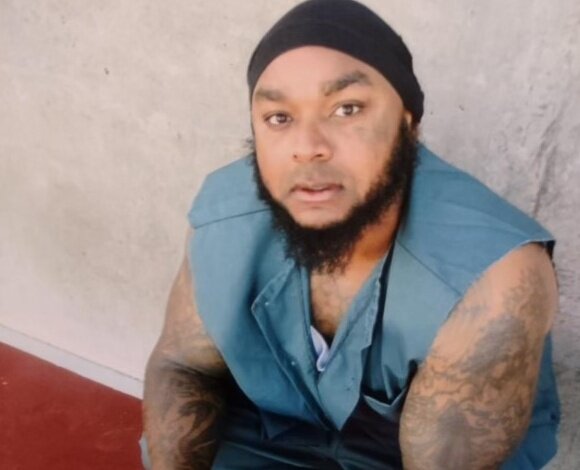I was born in Cincinnati, Ohio, on May 25, 1981. My mother was 14 when she became pregnant with me, and 15 when I was born. She raised me by herself; my father was just the sperm donor and never spent any quality time with me. When she was 17, my mother became pregnant again, and gave birth to my lil brother, Rohveah Anderson. She wasn’t around much though; still a child herself, my mother spent many nights working or club hopping with her friends. So, my grandmother felt more like a mom to me.
I was raised in the Mount Auburn neighborhood, which had the usual poverty, robbery, drugs and violence. But when the crack epidemic came, the neighborhood changed for the worse. You could say I was a problem child. My mom and grandmother kept us clean and neat, but couldn’t afford the name-brand clothes the other kids in the neighborhood had. So, I was picked on at school. This got to me, and my attitude toward life started to change. I felt less fortunate. I’d see guys selling drugs at school, and they had nice cars, glitter and women. I wanted that too.
The grip of drugs
And I had role models: My uncle Terry was on drugs and so was my Uncle Derrick’s father. I was diagnosed with ADHD as a child and prescribed Ritalin, but when I didn’t react well, I was taken off it. At 10, I started smoking weed. By 12, I was selling crack as well. Music was another outlet for me, maybe because I knew my father was a DJ. I started making rap music around the same time, along with one of my homeboys called Tech.
I caught my first felony at the age of 13; I broke a dude’s nose. It seemed like once I went through that door the first time, it became normal. I was living without a purpose.
That’s when I got deep into street life and developed a name for myself. This was my way of getting the attention I wanted from my mother. I started robbing, selling drugs, fighting, etc. Word on the streets was that I was crazy and dangerous.
Just like one of my uncles (who was killed when I was 5), I was feared and respected at the same time. I loved the attention and thrived off of it. It was like a weed high that never left. Females would say I was a handsome boy but most were afraid of me because of my reputation. This went on for years. Jail became my new home; I was constantly in and out. In the ghetto, going to jail was like earning stripes. You get tattooed..fight..come home with a reputation to match.
Fatherhood at 16
At the age of 16, the mother of my child, Darnesha Rodgers, became pregnant with my beautiful daughter Monique. I knew I had to take care of her, so I could be sure she had everything she needed. So, I sold crack and weed and even robbed to put food on the table.
A year later, I was shot at a house party. I could have died, but I was willing to die for my reputation. Many childhood peers passed away at that time. Some committed suicide, some were killed by rivals, some died at the hands of police officers.
Shortly after, I sold an undercover police officer a 20-piece of crack cocaine. Instead of being placed in a rehab center to get the help I really needed, I was sent to a juvenile detention center in Cleveland. I worked out and got tattoos, but didn’t focus on a better way of life. When my grandmother died, it really affected my mental state. I lashed out at the guards and got into fights. I became such a problem that I was placed in lockdown. I came out of my cell only one hour a day to shower, with my hands and feet shackled. My mother visited and when she saw me, she cried, asking why they had me shackled like this. But I was a threat to the institution and those around me.
When I finally got out, my neighborhood was no longer there. It had been shut down due to a lot of drug dealing. Christ Hospital in Cincinnati bought the property and gentrification pushed us out of our habitat. A lot of people lost their lives after that happened. I had a friend who found out he had AIDS; he killed his girlfriend and then killed himself. So many friends killed one another over chump change.
I was out of jail for two weeks before I was back in the mix. I was drinking and smoking a lot of marijuana, which triggered my behavior. Plus, I listened to a lot of 2pac music, and that put me in a depression. I could relate to his struggle. It’s like his music talked to me. It possessed me, and made me angry.
In and out of state prison
After just a year of freedom, I was charged in 2001 with robbery and felonious assault, during which a man was shot (but not by me). In Ohio, when you are charged with a crime, they “enhance” (build up) the charges so you can cop out to something less without beating the rap. For instance, if you’re charged with one robbery, they’ll indict you for three. I ended up beating all the charges except the felonious assault, and I was sentenced to eight and a half years in prison.
What happened next is sort of a long story, but while I was in state prison, I ran into a witness in my case who knew I wasn’t the shooter. He signed an affidavit on my behalf, and after a new trial, I was home on a monitor for three months, since I was still young.
It was another chance to go straight, but I was again swallowed by my environment; I started selling drugs. One night, some officers jumped out on me and took my car keys. They searched my car and found drugs. I ended up back in prison for three years, but was targeted by the police again as soon as I got out. I was sentenced to 18 months for trafficking cocaine and marijuana possession.
Meanwhile, my brother Ryan followed me into prison for manslaughter. He got 13 years and we found ourselves together, in the same state prison. It was during that time that one of my uncles was shot in the back of the head twice. He watched our childhood friend die in his arms over a couple hundred dollars. A few months later, my little brother Rohveah was shot at a club. It’s an understatement to say it was a rough stretch.
True love…and federal prison
I got out on Nov. 3, 2006. On Nov. 11, I met the love of my life, Erica. My daughter, Monique, was living with her mother in Toledo, but I was able to see her now and there. I made sure I sent her money and bought her things for Christmas. My life seemed to be turning around.
But I was only out 11 months when I caught the charge that sent me into federal prison. Sad to say, I went out one night to a club and I ended up having to defend myself. I fled the scene in fear of my life, and some officers got behind me and turned their lights on. I complied at first and pulled over, but when the officers ran up on my car with their guns out, I fled because I thought they were going to kill me. I ended up being caught with my firearm.
It was devastating to leave my family again. I left a good woman behind. I left my daughter again. I left my mother again. I wanted to die when I got a federal sentence. I didn’t think I was going to make it. I was afraid I would kill someone in prison. I’ve been locked up ever since.
I was sentenced to 293 months (24 and a half years). But I shouldn’t still be in prison. Although I was charged with the shooting of a woman in the club, that charge was dropped. And the court later admitted that my prior felonies don’t qualify for sentencing enhancement under the Armed Career Criminal Act (see United States v. Burris 2019), which means I should have gotten a maximum of 10 years. But I’m still here, 17 years after my conviction on October 11, 2007. Since then, I’ve been sent to eight federal prisons.
Finding my purpose
My turning point was my conversion to Islam in 2009. I began reading, studying and praying five times a day. I looked in the mirror and realized that I was the problem. I had to make better decisions in my life if I wanted to succeed. Everyone has a purpose, and it took maturing and a lot of prayer for me to discover mine. I know now that if I put Allah first, everything else will fall into place.
I also owe this progress to Erica. She has been with me my whole bid [sentence], and to this day she still is here. She visits me at least twice a month. Meanwhile, I now have a grandson named Armon who will be 6 years old in June. My mother and daughter Monique bring him to see me.
I’ve completed over 50 programs, obtained my GED and trained in dry-walling and carpentry. I am currently in the Challenge Program, the BOP’s flagship rehabilitation program. I am writing a self-help book about my journey through the prison system.
Looking back, and thinking about the other young people who are following in my footsteps, what I think could have made a difference is encountering staff members in jail and prison who actually cared. I needed someone who saw the real me and said, “Raymon, you can change.”




